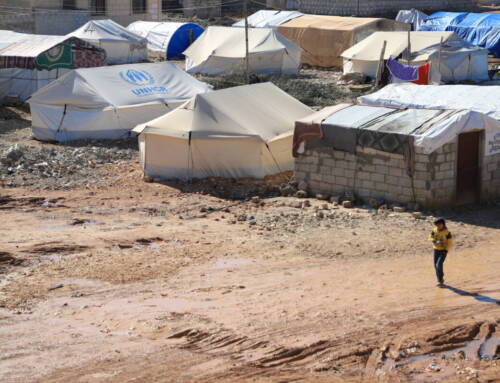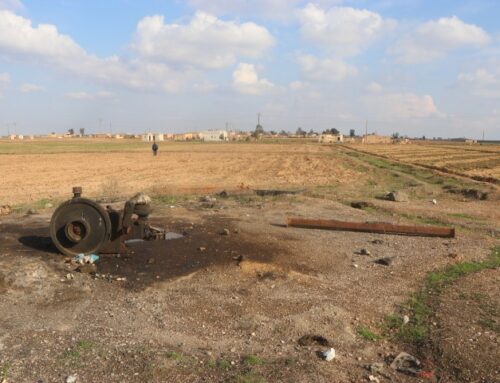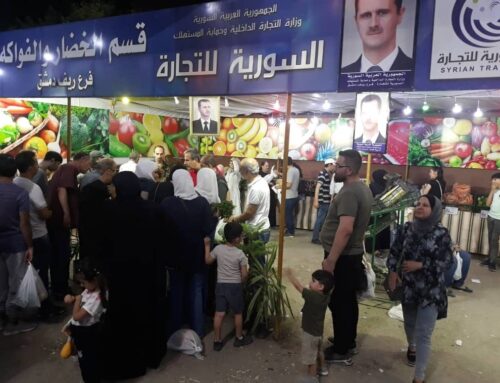East Ghouta loses its breadbasket: ‘The regime exploited the ongoing infighting’
AMMAN: Syrian army forces captured most of East Ghouta’s southern […]
19 May 2016
AMMAN: Syrian army forces captured most of East Ghouta’s southern agricultural Marj region on Thursday, civilian and military sources tell Syria Direct, in a massive offensive that is sending thousands of civilians fleeing on foot and threatening the main food source for all of the blockaded suburbs east of Damascus.
“Marj is a breath away from falling into the hands of regime forces,” Jaish al-Islam General Staff spokesman Hamzah Beriqdar told Syria Direct on Thursday. Jaish al-Islam fighters make up the bulk of the rebels stationed in the Marj pocket, alongside Failaq a-Rahman and Jabhat a-Nusra.
The Syrian regime began a campaign to separate Ghouta’s southern Marj region from the rest of East Ghouta late last year, and have continued military operations in the area since then.

This past Tuesday, regime forces supported by Hezbollah launched an attack on Marj from multiple directions, captured the town of Deir al-Asafir and continued a swift push forward. By Thursday morning, some pro-opposition media was reporting that the entire Marj area had changed hands to the regime.
Amidst conflicting reports and ongoing fighting on the ground in East Ghouta, it is difficult to verify just how much territory in Marj regime forces have taken so far or how firm that control is.
Syrian state media has not commented on the latest fighting in Marj, though multiple pro-regime outlets have reported advances in the area.
Weeks of infighting in East Ghouta between Jaish al-Islam and forces led by rival faction Failaq a-Rahman appear to have facilitated the rapid regime advance into Marj, distracting rebel brigades and preventing reinforcements from reaching fronts with the regime.
“The regime exploited the ongoing infighting,” JAI’s Beriqdar told Syria Direct, alleging “Jabhat a-Nusra cut the supply roads and prevented the arrival of JAI reinforcements to the southern area of East Ghouta.” In East Ghouta, Nusra is part of Jaish al-Fustat, which has fought with Failaq a-Rahman against JAI in recent weeks.
Despite reaching a ceasefire agreement just 10 days ago, the brigades have continued attacking each other over the past several days.
On Wednesday, at least part of Jaish al-Islam’s forces stationed in Marj withdrew from the fronts just before the latest regime gains as a direct result of the infighting, a JAI fighter told Syria Direct on Thursday, requesting anonymity.
“Nusra had cut the road to us [in Marj] and prevented the evacuation of the wounded and the entry of food and reinforcements,” he told Syria Direct. On Wednesday, “JAI fighters were able to open a gap in the road, which was being covered by Nusra snipers, and the order was given to withdraw.” Syria Direct cannot independently confirm his account.
‘People will starve’
In the latest regime drive into Ghouta, much like the weeks of infighting that preceded and may have laid the groundwork for it, civilians are bearing the brunt of the consequences.
“Civilians are fleeing on foot towards the Kafr Batna and Jisreen areas,” Ammar al-Hassan, a member of the pro-opposition LCC Union in Damascus told Syria Direct on Thursday from East Ghouta. Some 4,000 people have fled Marj so far, said al-Hassan.
“The areas the regime has taken control of are the biggest agricultural storehouse for East Ghouta,” al-Hassan told Syria Direct. “People will starve and the blockade will intensify.”
“Regime control over the area will negatively impact residents, fighters and civilians alike,” JAI’s Beriqdar told Syria Direct. “Ghouta has now lost its breadbasket and economic resource.”
Trapped by a blockade, unable to stop ongoing rebel infighting and watching as regime forces advance steadily to the south, East Ghouta residents are feeling the pressure.
“I broke down yesterday,” said one Ghouta resident who spoke to Syria Direct on Thursday, requesting anonymity. “I went out into the street at night, screamed at the top of my lungs and started crying.”
“The factions are busy fighting each other; they don’t have time to fight the regime.”







